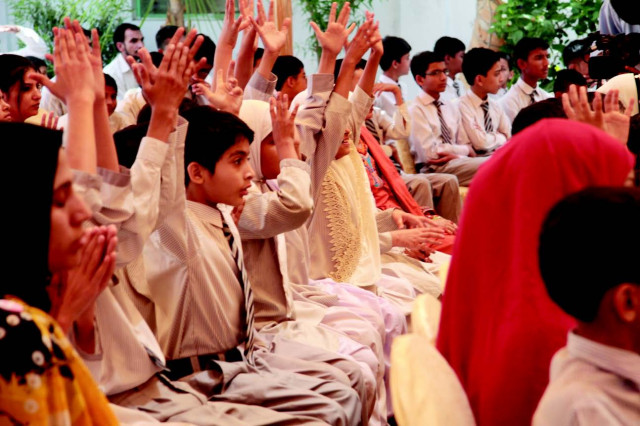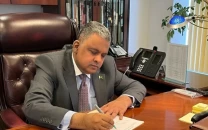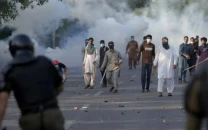JS Academy for the Deaf: Dancing to the beat, without hearing the music
One student went to the Indus Valley school and is now working with a fashion designer.

Don’t be surprised to hear music at the school for the deaf. The children dance to the beat and tap their feet to a rhythm they cannot hear.
The parents watch delightfully as their little ones raise their hands over their heads — gesturing to their fellows on stage that they love the performance. On Saturday, the Jahangir Siddiqui Academy for the Deaf organised an event to inaugurate a new building block.
Nausheen, a proud mother of Insha, smiled when she saw her daughter’s eyes light up during the performances. “We found out that she was deaf when she was about two years old,” she explained.
The family sensed something was wrong when Insha would not respond to sounds no matter how loud they were. This prompted Nausheen to get her examined by a doctor, who confirmed that the girl’s hearing was impaired. Initially, Nausheen was worried about her daughter’s future but today she feels it looks bright.
As Insha prepares for her Matriculation exams, her mother is grateful to her teachers who gave her daughter “a language I couldn’t speak”. Nausheen admitted that she herself is not proficient in sign language and uses basic gestures to communicate with Insha.
Insha, one of the 4.2 million deaf children in Pakistan, learned how to read and communicate in sign language at the JS Academy, which recently expanded to include the alShafi Art and Culture Centre for the Deaf. The new centre gives them a place to exhibit their colourful and intricate handicrafts.
A project of the Noor-e-Ali Trust, this six-year-old school has 150 deaf students and a staff of 25 teachers, who focus on vocational training. The chairperson, Laila Dossa, who has been working with special children in Pakistan for 30 years, explained that the school has introduced a programme which helps parents learn sign language.
“As deaf children grow up, their emotions become more complex and they need to be able to communicate efficiently with their family,” she said. The school also provides counselling to students who wish to express their problems.
“These children should not be called ‘deaf and dumb’,” warned Dossa. The word ‘dumb’ denotes stupidity, and her students’ work shows that they are “extremely intelligent”, she clarified. Dossa also disapproved of the word “disabled children” and said that it is politically incorrect and should be replaced with “differently abled persons”.
According to Dossa, the education for deaf children is in a “pathetic condition” because the country lacks special schools, qualified teachers and audiologists. She takes pride, however, in the success of her students, such as Shiraz Ahmed and Munim Qazi, who graduated from the Indus Valley School of Art and Architecture.
Qazi, whose fellow graduates remember him as “extremely talented”, is currently working with fashion designer Nida Azwer.
Published in The Express Tribune, April 10th, 2011.



















COMMENTS
Comments are moderated and generally will be posted if they are on-topic and not abusive.
For more information, please see our Comments FAQ